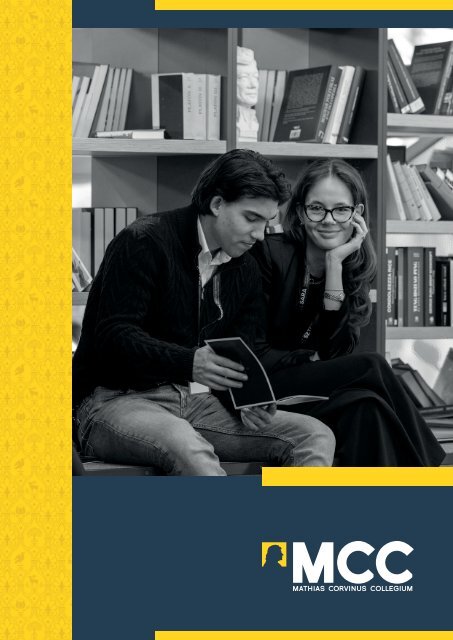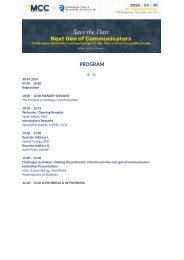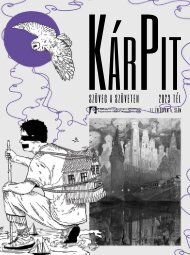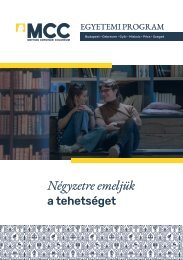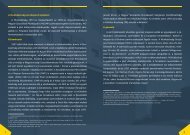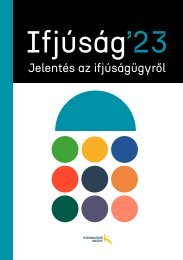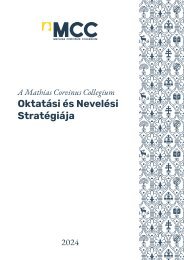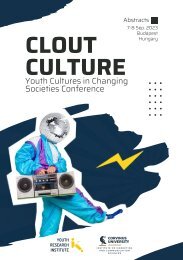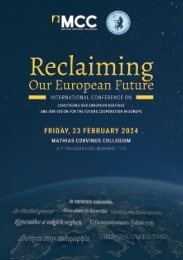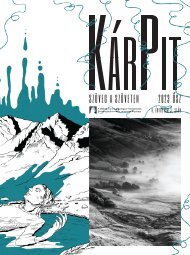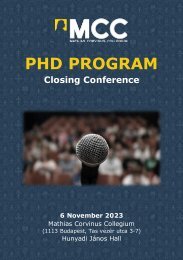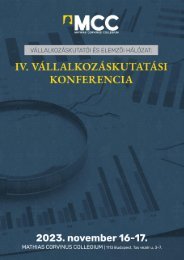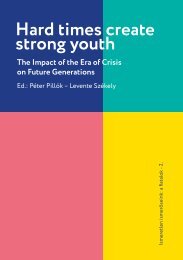MCC Bulletin 2024 - eng
You also want an ePaper? Increase the reach of your titles
YUMPU automatically turns print PDFs into web optimized ePapers that Google loves.
CONTENTS<br />
The <strong>MCC</strong> Story 2<br />
Our Mission 4<br />
<strong>MCC</strong> Management 6<br />
The Teaching and Educational Strategy of <strong>MCC</strong> 8<br />
Youth Talent Program 10<br />
High School Program 12<br />
University Program 14<br />
Roma Talent Program 16<br />
Postgraduate Programs 18<br />
<strong>MCC</strong> Leadership Academy 22<br />
<strong>MCC</strong> Debate Academy 24<br />
Public Affairs Programs 26<br />
Postdoctoral Book Publication Contest 30<br />
PhD Program 31<br />
International Activities 32<br />
Research Institutes 42<br />
Book Publishing 48<br />
Career and Alumni Center 50<br />
Student Projects 52
THE <strong>MCC</strong> STORY<br />
”It is crucial to support younger generations. In primary school, they already study<br />
biology, they are interested in the world, and they compete with each other. We need<br />
to inspire them to keep them interested.”<br />
Katalin Karikó, Nobel Prize-winning biochemist and research biologist<br />
1996 Founding<br />
2001 First residence hall opened<br />
2002 Launch of the High School Program<br />
2008 <strong>MCC</strong> enters the book market as a co-publisher<br />
2009 Launch of the Leadership Academy<br />
2010s<br />
Launch of the High School Program in Transylvania<br />
2015 Launch of the Young Talent Program<br />
2017 Launch of the Public Affairs Programs<br />
2018 Launch of the Roma Talent Program<br />
2019 Launch of the Debate Academy<br />
2020 Establishment of the Mathias Corvinus Collegium Foundation<br />
2021 <strong>MCC</strong> expands to 23 cities in the Carpathian Basin<br />
2022 Launch of <strong>MCC</strong> Brussels, the first center in Western Europe<br />
2023 <strong>MCC</strong> expands to Slovakia and Austria<br />
2
In the years to come:<br />
35 Regional Centers in Hungary and abroad<br />
3,000 primary school students<br />
4,500 high school students<br />
1,500 university students<br />
500 young adults in other training programs<br />
From September <strong>2024</strong>:<br />
9,000 students in 18 locations in Hungary and 12 Hungarian-inhabited settlements abroad<br />
2,500 primary school students<br />
4,500 high school students<br />
600 university students<br />
+ Youth involved in the Roma Talent Program and other training courses<br />
<strong>MCC</strong>’S REGIONAL CENTERS<br />
BRÜSSZEL<br />
(BRUSSELS)<br />
1129 KM FROM BUDAPEST<br />
BEREGSZÁSZ<br />
(BEREHOVE)<br />
DUNASZERDAHELY<br />
(DUNAJSKÁ STREDA)<br />
MISKOLC<br />
NYÍREGYHÁZA<br />
BÉCS<br />
(VIENNA)<br />
SZATMÁRNÉMETI<br />
(SATU MARE)<br />
GYŐR<br />
BUDAPEST<br />
DEBRECEN<br />
SZOMBATHELY<br />
VESZPRÉM<br />
SZÉKESFEHÉRVÁR<br />
SZOLNOK<br />
NAGYVÁRAD<br />
(ORADEA)<br />
ZALAEGERSZEG<br />
RÉVFÜLÖP<br />
KECSKEMÉT<br />
BÉKÉSCSABA<br />
KOLOZSVÁR<br />
(CLUJ NAPOCA)<br />
MAROSVÁSÁRHELY<br />
(TÂRGU MUREȘ)<br />
CSÍKSZEREDA<br />
(MIERCUREA CIUC)<br />
KAPOSVÁR<br />
PÉCS<br />
SZEKSZÁRD<br />
SZEGED<br />
ARAD<br />
SZÉKELYUDVARHELY<br />
(ODORHEIU SECUIESC)<br />
VERESSZÉK<br />
SEPSISZENTGYÖRGY<br />
(SFÂNTU GHEORGHE)<br />
3<br />
<strong>MCC</strong> REGIONAL CENTER<br />
UNIVERSITY PROGRAM<br />
HIGH SCHOOL PROGRAM<br />
YOUNG TALENT PROGRAM
OUR MISSION<br />
Mathias Corvinus Collegium (<strong>MCC</strong>) is an educational institution and research center devoted to the<br />
flourishing of the Hungarian nation. Built on a 1,000 years of Hungarian and Western traditions,<br />
<strong>MCC</strong> serves local communities and Hungary by educating open-minded young individuals with a<br />
patriotic mindset and realistic approach to the world. Aware of the unique chall<strong>eng</strong>es facing Hungarians<br />
in the 21st century, <strong>MCC</strong> is committed to providing excellent supplemental education, without<br />
charge, to young Hungarians throughout the Carpathian Basin. To align with their vision, the founders<br />
opted to name our institution after Mathias Corvinus, one of Hungary’s most renowned kings.<br />
During the 15th century, under Mathias Corvinus, Hungary entered into a golden age. With the<br />
king introducing Renaissance ideas and establishing the country as a prominent intellectual hub in<br />
Europe. His reign exemplified the key elements necessary for Hungary’s advancement: a commitment<br />
to knowledge, patriotism, and a willingness to embrace external sources for innovative solutions and<br />
ideas, elements now embodied in Mathias Corvinus Collegium.<br />
Supporting highly talented young people is a vital public interest that also has a significant impact on<br />
our country’s competitiveness. Since its foundation in 1996, Mathias Corvinus Collegium has grown<br />
into the largest extracurricular education provider in the Carpathian Basin. Starting with only a handful<br />
of students, <strong>MCC</strong> initially focused on developing and mentoring high-school and university students.<br />
The dedication and passion of its staff and students, however, led to a gradual expansion of<br />
<strong>MCC</strong>’s programs, outreach, and mission. In 2001, <strong>MCC</strong> secured a residency hall to provide housing<br />
for its students and further cement <strong>MCC</strong> as a community-based model of education.<br />
The 2000’s and 2010’s not only saw an expansion of <strong>MCC</strong>’s educational programs to development<br />
programs for all ages, but also a physical expansion outside of Budapest with the opening of regional<br />
centers throughout Hungary and the Carpathian Basin. Today, we are proud to offer free educational<br />
programs for all ages, from talented students in primary and secondary schools to those in higher education<br />
and beyond.<br />
By the end of <strong>2024</strong>, more than 7,300 students will be involved with at least one of our diverse programs.<br />
Within the next few years, we plan to increase this number to 10,000. Furthermore, we will increase<br />
the number of our regional centers from 28 locations to a total of 35 Hungarian-inhabited cities across<br />
the Carpathian Basin. In addition to our newly established centers in Vienna and Brussels, <strong>MCC</strong> is<br />
also committed to sending our students to other Western European cities and bringing Western intellectuals<br />
to Hungary. We regularly invite the best teachers and guest speakers to collaborate with and<br />
improve our professional programs. At the same time, we are renovating the many historic buildings<br />
that house our educational centers, reviving and adding beauty to the surrounding local communities.<br />
4
<strong>MCC</strong> also complements its educational activity with a network of institutions which provide a variety<br />
of services such as publishing books, planning international conferences, conducting research, and<br />
organizing unique domestic and international scholarship programs. These activities have contributed<br />
to making the Collegium an internationally recognized research center.<br />
Our paramount objective is to bestow upon Hungary a cohort of exceptional young individuals who<br />
possess familiarity with global dynamics and exhibit a sense of responsibility towards their personal<br />
destiny and the collective future of Hungary and all Hungarians. <strong>MCC</strong>, as a private educational foundation,<br />
is neither a competitor nor an alternative to public and higher education. Instead, it offers<br />
various programs and activities that complement the regular curriculum of Hungarian universities and<br />
schools while providing additional learning opportunities. Our students are not admitted purely on<br />
educational merits but on their desire and willingness to help their local communities, fellow Hungarians,<br />
and develop their talents for the benefit of themselves and Hungary.<br />
While <strong>MCC</strong> is ideologically independent, we are not value neutral. The environment that is fostered<br />
at <strong>MCC</strong> is one which encourages patriotism, respect for tradition, a realistic approach to global affairs,<br />
and care for the Hungarian nation and the future of the Western world.<br />
”There are moments in life that leave an indelible mark. Working with <strong>MCC</strong> is a series of such moments.<br />
Since my first visit to Hungary and to <strong>MCC</strong>, I have grown increasingly fond of this institution,<br />
which trains dedicated young people who have the potential to become the leaders of the Hungary of the<br />
future, both in the private and public sectors. The role played by <strong>MCC</strong> is one that is absent in many other<br />
countries. Although, since 2014, I have radically reduced my teaching commitments, I have kept my<br />
collaboration with <strong>MCC</strong> to support their mission. In a world where we are lurching from one crisis to<br />
another, and where strong leadership is, sadly, lacking, <strong>MCC</strong> and similar institutions embody the hope<br />
of a better world.”<br />
David Venter - Visiting Fellow, <strong>MCC</strong>, Professor, Cape Town University, Vlerick Business School, Gent<br />
OUR VALUES<br />
Our work begins where conventional education ends.<br />
▪ Education that cultivates interdisciplinary talent<br />
▪ Internationally outstanding quality<br />
▪ Patriotism and fidelity to the hungarian nation<br />
▪ A developmental approach to the holistic growth of individuals<br />
▪ Fostering a supportive and dedicated community<br />
▪ Continuous and open communication<br />
▪ A prompt, adaptable, and efficient response to needs<br />
▪ Responsible and circumspect management<br />
5
BOARD OF TRUSTEES OF THE <strong>MCC</strong> FOUNDATION<br />
Balázs Orbán<br />
Chairman of the Board of Trustees<br />
András Lánczi<br />
Former Rector of Corvinus University<br />
László Madarász<br />
Banker, Financial Expert<br />
Áron Szakács<br />
Managing Director at Széchenyi Program<br />
Office<br />
LEADERSHIP<br />
Zoltán Szalai<br />
Director General<br />
Péter Lánczi<br />
Deputy Director-General<br />
Adrienn Szabó-Hontvári<br />
Deputy Director-General for Economic<br />
Affairs<br />
Gabriella Dudás<br />
Deputy Director-General for Procurement<br />
and Legal Affairs<br />
Milán Constantinovits<br />
6<br />
Deputy Director-General for Professional<br />
Affairs<br />
Péter Túri<br />
Deputy Director-General for Postgraduate<br />
Programs<br />
Pál Valentinyi<br />
Deputy Director-General for Strategy
SUPERVISORY BOARD<br />
Gergely Deli Supervisory Board Chair<br />
Zoltán Kovács-Osváth Supervisory Board Member<br />
Levente Hegedűs Supervisory Board Member<br />
BOARD OF PATRONS<br />
János Csák, Minister for Culture and Innovation, Former Ambassador of Hungary to the UK<br />
Zoltán Lomnici, Jurist, Member of the Constitutional Court of Hungary, Former President of<br />
the Supreme Court<br />
†John Lukács, Historian<br />
Nándor Fa, Sailor, Shipbuilder<br />
Péter Forgách, Ophthalmologist, Founder of the Calasanctius Scholarship Foundation<br />
Miklós Maróth, Professor, Orientalist, Classical Philologist, Full member of the Hungarian<br />
Academy of Sciences<br />
† András Oplatka, Expert on Central and Eastern Europe, Journalist<br />
Péter Paczolay, Former President of the Constitutional Court<br />
Krisztián Sauska, Owner, CEO, Light Sources<br />
Lajos Vékás Professor of Law, Full member of the Hungarian Academy of Sciences<br />
INTERNATIONAL ADVISORY BOARD<br />
Gwyn Bevan, Director, Professor, LSE, London<br />
Ceferi Soler Vicente, Professor, ESADE Business School, Barcelona<br />
Guido Stein, IESE Business School, Barcelona<br />
Stephen Perkins, professor emeritus, London Metropolitan University, UK, Senior Research<br />
Fellow, Global Policy Institute<br />
David Venter, Professor, Psychologist, Former Communications Advisor to Nelson Mandela<br />
7
TEACHING STRATEGY<br />
As a talent education institution, Mathias Corvinus Collegium designed its education system according<br />
to the latest pedagogical principles. Its operating model is based on the traditions and best practices<br />
of Hungarian higher education, as well as the experience of Anglo-Saxon social science education and<br />
the methodological achievements of innovative formal and non-formal pedagogy.<br />
We believe it is important to establish a constructive dialogue and continuous exchange of experience<br />
with all stakeholders in education and upbringing, and to this end we organise professional forums in<br />
cooperation with teachers and a series of events called Parents’ Academy for parents in various cities<br />
to support family development. We can succeed in our talent management activities in alliance with<br />
public and higher education institutions, because the promotion and conscious training of the best of<br />
the next generation is a shared task and a common interest.<br />
Our institution implements a complex educational talent development program. In the spirit of lifelong<br />
learning, it offers development opportunities from upper secondary school to post-doctoral level.<br />
Its public life academies, events, and academic competitions provide opportunities to <strong>eng</strong>age with its<br />
programs beyond the curriculum. The general characteristics of our Collegium’s educational system<br />
can be summarized in the following 12 principles:<br />
1) Linear training structure - with multiple levels of entry<br />
2) Community responsibility, national commitment<br />
3) Multidisciplinary approach<br />
4) Practice-oriented approach, relevance, continuous knowledge management<br />
5) International scientific horizon<br />
6) Small group, personalized learning<br />
7) Complex and diversified pedagogical tools<br />
8) Combining digital and in-person learning<br />
9) Tutorial teaching system<br />
10) Person-centered and multifaceted performance assessment system<br />
11) Multifaceted and continuous quality control<br />
12) Adaptive and motivating learning environment<br />
The full text of our<br />
Teaching and Educational<br />
Strategy<br />
is available on our website:<br />
8
EDUCATIONAL STRATEGY<br />
The educational strategy of Mathias Corvinus Collegium is based on the institution’s principles, with<br />
a particular emphasis on personal and communal development. We believe that talent development<br />
is not only about imparting professional knowledge and developing skills, but also about developing<br />
the whole personality through community experiences and a consciously designed system of activities.<br />
<strong>MCC</strong>’s educational strategy holistically develops and trains individuals who are open-minded, feel responsible<br />
for their national, local, and familial communities, are willing to act, are familiar with the cultural and<br />
historical traditions of Hungary, and wish to learn more about the world. Our objective is to help students<br />
to develop self-expression skills and critical thinking, gain a high degree of intellectual autonomy, develop<br />
a sense of individual responsibility and entrepreneurial spirit, and continuously widen their intellectual<br />
horizons and gain excellent problem-solving skills.<br />
We believe that personal development can only be effective through community-based experiences. To<br />
this end, our Collegium organizes varied programs that have, beyond the educational elements, art-related<br />
aspects as well as activities for healthy physical development.<br />
THE <strong>MCC</strong> TRAINING SYSTEM<br />
9
YOUTH TALENT PROGRAM<br />
PRIMARY SCHOOL PROGRAM<br />
In the fall of 2015, <strong>MCC</strong> launched its extracurricular program for middle school students from grades<br />
5-8. Our Youth Talent Program (YTP) stimulates children’s desire for knowledge, prepares them for<br />
further studies, and helps them make informed career choices and achieve self-fulfillment in their lives.<br />
Additionally, its courses help participants improve their motivation, work ethic, self-confidence, and<br />
provide an opportunity to make lasting friends. Students can learn from a variety of interesting and<br />
dynamic topics, from basic finance to drone technology, astronomy, robots, spectacular chemistry experiments,<br />
and futurology. Assisted by renowned experts and specialist psychologists, the program is<br />
based on digital learning materials for home learning, as well as the occasional class lesson on Saturdays.<br />
<strong>MCC</strong> also maintains close contact with the participants’ parents and teachers by organizing presentations<br />
and other events for them. Since 2023, the Youth Talent Program has eighty staff members,<br />
two hundred teachers, and has worked with nearly two thousand students. Courses are held in sixteen<br />
locations in Hungary, seven in Transylvania, one in Transcarpathia, and one in Slovakia.<br />
The program is available in the following cities: Romania: Arad, Kolozsvár (Cluj-Napoca), Csíkszereda<br />
(Miercurea Ciuc), Nagyvárad (Oradea), Szatmárnémeti (Satu Mare), Sepsiszentgyörgy (Sfântu Gheorghe)<br />
and Marosvásárhely (Târgu Mureș). Ukraine: Beregszász (Berehove). Slovakia: Dunaszerdahely<br />
(Dunajská Streda). Hungary: Békéscsaba, Budapest, Debrecen, Győr, Kaposvár, Kecskemét, Miskolc,<br />
Nyíregyháza, Pécs, Szekszárd, Szeged, Székesfehérvár, Szolnok, Szombathely, Veszprém, and Zalaegerszeg.<br />
10
COURSES INCLUDE<br />
• Astronomy and Space Research<br />
• Robotics<br />
• The World of Drones<br />
• Personal Development<br />
• Health Awareness<br />
• Science Lab<br />
• Adventures in Biology<br />
• Media and Internet Awareness<br />
• Creative Writing<br />
• Environmental Awareness and Conservation<br />
• The World of Theater<br />
• Tracking World Religions<br />
• Walks in the Past<br />
• Financial Awareness<br />
• Communication and Debate Culture<br />
YOUTH TALENT CLUB<br />
In October 2023, <strong>MCC</strong> launched the Youth Talent Club which allows more young people to<br />
explore the world of the Youth Talent Program, with adventures, community experiences, and<br />
exciting chall<strong>eng</strong>es tailored to their age group.<br />
Fifth-grade students can take part in courses, sessions, and experiential activities held by program<br />
instructors or local experts.<br />
Comprised of three-hour afternoon sessions held every two weeks, program activities are a playful<br />
and interactive way to expand the knowledge of the participants.<br />
Some of the e-learning materials for the program’s courses are also available for children attending<br />
the Youth Talent Club. The Club, like the Youth Talent Program, builds on the partnership<br />
with parents. Our free Parents’ Academy is open to all parents whose children participate in the<br />
Youth Talent Club sessions, as well as parents interested in our programs.<br />
11
HIGH SCHOOL PROGRAM<br />
Launched in 2002, <strong>MCC</strong>’s High-School Program (HSP) offers tuition-free remote courses and in-person<br />
Saturday sessions for gifted high school students across the Carpathian Basin. HSP is currently<br />
available in 16 cities in Hungary, eight cities in Transylvania, and both Transcarpathia and Slovakia.<br />
With more than 4,500 students enrolled, HSP offers intensive Saturday training courses called HSP<br />
Saturdays, club meetings, weekly presentations, skills trainings, professional discussions, and e-learning<br />
courses. Upon completion of the entry-level program, additional opportunities are offered to the<br />
students. These include the HSP+ tours and HSPremium sessions, as well as foreign language courses,<br />
study trips abroad, and other exciting opportunities.<br />
HSP provides programs for <strong>MCC</strong> students that support their development and individual academic<br />
and career goals. HSP also serves as an important link between programs within <strong>MCC</strong>’s curriculum:<br />
eighth-grade students completing the Youth Talent Program are offered additional flexible training<br />
pathways for HSP, while high school students approaching graduation can join the Junior Training<br />
Program offered by the University Program.<br />
By providing supplemental material to their high school curriculum, the program helps students choose<br />
a career path, successfully prepare for their university studies, and assist them in making long-term career<br />
plans. At the same time, high school students will become members of an open-minded, curious,<br />
and dynamic community. When designing the HSP curriculum, particular focus was given to topics<br />
and skills that are not so widely taught in secondary education but are often found in university courses.<br />
”When I joined the High School Program, I had no idea I would end up at such a great place. A place<br />
where we have fun learning from the best teachers, and where great opportunities are just waiting to be<br />
seized. Here I have found the community that I always wanted to belong to. <strong>MCC</strong>’s motto best sums up<br />
what <strong>MCC</strong> is really about: “Bonus intra, melior exi” or “Enter as good man, leave as a better one.”<br />
Miklós Havasi-Thuránszky – Pécs<br />
In 2022, <strong>MCC</strong> launched its scholarship program for high school students. This scholarship assists<br />
pupils with outstanding skills in academia, sports, and the arts who are involved in community<br />
service in preparing an independent project. Under the scholarship program, students work<br />
on an individual project, guided by a mentor. In addition to being supported by HSP mentors,<br />
students also participate in various courses and events at <strong>MCC</strong>.<br />
MAIN TRAINING AREAS:<br />
• Argumentation and Debating<br />
• Communication 12<br />
Skills, Self-Reflection<br />
• Public Speaking and Presentation Skills<br />
• Career Guidance and Self-Awareness
Student attendance at program events is flexible;<br />
however, active participation and good<br />
academic results are requirements for completing<br />
the program and participating in<br />
further <strong>MCC</strong> programs. Due to our diverse<br />
selection of courses, students are allowed to<br />
choose modules that best suit their needs,<br />
motivation, and individual learning plans.<br />
”For me, the High School Program represents a wealth of opportunities. It helps me to spread my wings<br />
and contributes to my personal development. It is a very good community, where the spirit of cohesion<br />
is constantly in the air. This sense of community and the various program elements bring color into<br />
everyday life. Just thinking of <strong>MCC</strong> fills me with great joy and gratitude because my fellow students<br />
and the knowledge I gained during the lectures give me both confidence and the opportunity to prepare<br />
for life in the real world. HSP offers plenty of opportunities to integrate new knowledge, make friends,<br />
and develop, which will benefit me later on at university and in my professional life.”<br />
Zafira Szabó – Szeged<br />
E-LEARNING COURSES:<br />
Academic Writing (EN) Historical Case Solving Writing skills A Different Approach<br />
to Literature<br />
Law<br />
Economics<br />
Modern history International Relations<br />
Psychology Social studies History/Writing<br />
13
UNIVERSITY PROGRAM<br />
BUDAPEST | KOLOZSVÁR | DEBRECEN | GYŐR | MISKOLC | PÉCS | SZEGED<br />
<strong>MCC</strong>’s flagship intitiative, the University Program (UP) consists of a one-year Junior Training Program<br />
for first-year college students, followed by a two-year program in one of <strong>MCC</strong>’s Schools for second and<br />
third-year students.<br />
The education students receive greatly contributes to their eventual and hopefully successful career<br />
path. Throughout their studies, students are continuously mentored, their individual skills and abilities<br />
developed, and given the opportunity to gain practical experience.<br />
The program currently allows students to explore six disciplines, represented by a different <strong>MCC</strong><br />
School: Law, Economics, International Relations, Social Sciences and History, Media, and Psychology.<br />
These schools provide solid professional, theoretical, and practical foundations for individual development.<br />
The University Program Offers<br />
• Personalized training in small group courses<br />
• Development and training opportunities throughout their university studies<br />
• Participation in joint projects with students from other universities<br />
• A diverse, supportive, and cohesive community<br />
• International scholarship opportunities<br />
• Free language classes<br />
• Internships and job opportunities with our partners<br />
• Free quality accommodation<br />
14
SCHOOLS AND RESEARCH CENTERS<br />
After the one-year Junior Training Program, students apply and join one of <strong>MCC</strong>’s six schools. This<br />
two-year course is open to students who have successfully completed their first year at university.<br />
<strong>MCC</strong>’s school system is a high-quality educational journey that complements a student’s university education.<br />
With its student-centered approach, <strong>MCC</strong> operates a constantly evolving educational system<br />
that seeks to balance intellect and emotion to shape the next generation’s view of their respective science<br />
and public life. All this is offered free of charge, regardless of the students’ financial situation.<br />
Our school system, and its unique design, gives enthusiastic young people the opportunity to develop<br />
their skills, foster an open mindset, study a diverse field of important topics and themes, learn from the<br />
best domestic and international experts, all while becoming part of a cohesive community. Students can<br />
be admitted through a separate admission procedure to the following schools:<br />
School of Law: Center for Law and Society, Center for Private Law,<br />
Center for Public Law, Center for International Law, Center for<br />
Modern Law Studies, Center for Criminal Law<br />
School of International Relations: Center for Foreign Economics,<br />
Center for Geopolitics, Center for European Studies, Center for<br />
Diplomacy<br />
School of Economics: Center for Enterprise Research, Center for<br />
Next Technological Futures, Center for Business Studies, Center for<br />
Economic Policy<br />
School of Media: Center for Journalism, StoryLab, Center for<br />
Freedom of Expression, Center for Business Communications<br />
School of Social Sciences and History: Center for Political<br />
Science, <strong>MCC</strong>-Rubicon Center for History, Center for<br />
Constitutional Politics, Center for Sociology, Center for<br />
Architecture and Memory<br />
<strong>MCC</strong>-Mindset School of Psychology: Center for<br />
Academic Psychology, Center for Sports and Performance,<br />
Center for the Health of the Child, Family and Society, Center<br />
for Cognitive Neuroscience<br />
15
ROMA TALENT PROGRAM<br />
Launched in 2018, the Roma Talent Program helps secondary and university students of Roma descent<br />
in their career path, entrance exams, and obtaining degrees.<br />
Students enrolled in this free-of-charge program attend local language courses, and can participate in<br />
monthly activities at <strong>MCC</strong>’s Budapest headquarters. Additionally, high-school students are offered<br />
personal mentoring by experienced mentors.<br />
The program emphasizes the importance of personal mentoring in building a strong community<br />
where Roma students can support each other in their future careers.<br />
We organize summer camps for our students and, to facilitate their studies, we also provide them with<br />
computers, which they will own after the successful completion of the program’s first year.<br />
We believe that supportive attitudes, community experiences, and skills development help reduce social<br />
inequalities. Interested students can join the Roma Talent Program in the first semester of the 9th<br />
grade.<br />
Thereafter, they take part in a variety of educational activities up to graduation which are designed to<br />
help them pass their final exams and gain admission to a university.<br />
The Roma Talent Program also serves high school graduates currently studying in higher education.<br />
The program thus supports talented Roma youth throughout their educational journey.<br />
16
”Here, I can gain knowledge that I could not get in school. I<br />
can participate in a program that gives me a chance to grow<br />
and be part of a motivating community in which I feel<br />
comfortable.”<br />
Attila<br />
17
POSTGRADUATE PROGRAMS<br />
Research Center Membership Program<br />
As Hungary’s largest interdisciplinary education and research center, <strong>MCC</strong> considers it a priority to<br />
foster a generation of Hungarian researchers who are seeking solutions to major chall<strong>eng</strong>es facing Hungarian<br />
society, committed to scientific methods, confident in communicating their own research results<br />
and able to interpret the results of other disciplines. The Research Center Membership program offers<br />
a one-year unique training opportunity for students graduating from the <strong>MCC</strong> Schools who see their<br />
future in academia and wish to participate in the vibrant intellectual life at <strong>MCC</strong>.<br />
At <strong>MCC</strong> it is our conviction that after a certain point, knowledge cannot be acquired in a linear fashion,<br />
and knowledge cannot be transferred using the frontal teaching method. Drawing on the best traditions<br />
of European university culture, <strong>MCC</strong> envisions education of the next generation of academics as based<br />
on discussion, community, and the mentor-student relationship. Through the mentorship of <strong>MCC</strong>’s<br />
outstanding center leaders and institute directors, the peer-to-peer environment of the center members,<br />
and the intellectual and physical infrastructure of <strong>MCC</strong>, we provide an opportunity for <strong>MCC</strong> students<br />
interested in research to get a taste of what a career in science is like in everyday life.<br />
The Research Center Membership Program develops trainees’ ability to find a common language to<br />
present their research findings. Too often, understanding scientific research is difficult for other researchers,<br />
but especially for the wider public. It is therefore indispensable that the new generation of<br />
scientists develop the ability to communicate their ideas and research.<br />
Junior Researcher Program<br />
The Junior Researcher Program, which builds on the Research Center Membership Program, enables<br />
<strong>MCC</strong> students to further progress their academic development. This program is open only to those<br />
students who have demonstrated exemplary diligence and commitment to research through the Research<br />
Center Membership Program. Participants are allowed more independence, resources, and responsibilities<br />
to conduct their research. Throughout the year, participants in the <strong>MCC</strong> Junior Membership<br />
Program are expected to be motivated, focused, and work with precision.<br />
18
Janus Pannonius Program Year<br />
Janus Pannonius (also known as János Csezmiczei) was one of King Matthias Corvinus’ close advisers<br />
and a member of his court. Yet, on several occasions during his life, he disconnected from the royal<br />
mainstream and traveled the world. At times he studied in Nagyvárad, at other times he performed his<br />
episcopal duties in Pécs, or he accompanied the king on his military campaigns.<br />
<strong>MCC</strong>’s newest postgraduate program was inspired by Janus’s complex and inspiring career path. Once<br />
completing their studies in one of the <strong>MCC</strong> schools, the Janus Pannonius Program Year, based on<br />
<strong>MCC</strong>’s interdisciplinarity, allows students to get the most out of any area of life and to spend a professionally<br />
free and valuable year at <strong>MCC</strong>. The program is activity-based, but all elements can be completed<br />
with a little perseverance and average fitness.<br />
The program provides participants with free accommodation in any <strong>MCC</strong> dormitory, access to all<br />
available <strong>MCC</strong> facilities, unique cultural and social programs tailored to the participants and a development<br />
scholarship.<br />
„<strong>MCC</strong> has helped me prepare for countless future chall<strong>eng</strong>es. I received important support for learning<br />
new languages, which is now essential and indispensable. Thanks to its outstanding educational structure<br />
and professional contacts, we have the opportunity to learn from the best experts in the field in both<br />
lectures and courses. We are backed by instructors who are dedicated, enthusiastic, supportive, and flexible.<br />
You can choose from a range of options according to your own career interests and the curriculum is<br />
relevant and up-to-date. It’s good to learn in an environment where students can not only have dreams<br />
but also are also provided resources to turn these dreams into reality.”<br />
Lili Mező – Debrecen<br />
19
Postgraduate Scholarship Program<br />
Modul University Vienna ▪ In 2023, <strong>MCC</strong> acquired a majority stake in the Vienna-based Modul University,<br />
which provides <strong>MCC</strong> and Carpathian Basin Hungarian students with another unique training<br />
and learning opportunity. Compared to other European universities, Modul University is a smaller-scale<br />
institution with a strong focus on economics,<br />
business management, and tourism. Its<br />
main teaching and research areas include<br />
management, sustainability, and applied<br />
data science. According to the 2020 edition<br />
of U-Multirank, which uses a multidimensional,<br />
user-driven approach to rank higher<br />
education institutions globally, Modul<br />
University Vienna is ranked among the top<br />
25 most cited universities in the world.<br />
Modul University provides standard practical<br />
training and runs extensive research programs in which <strong>MCC</strong> students, researchers, and academics<br />
have been involved since 2023. Teachers come from over 40 countries and the language of instruction<br />
is English. While in 2007, the Vienna and Nanjing campuses only offered three study programs<br />
for 80 students, as of today, 1,100 students are pursuing their studies in 11 different study programs.<br />
Modul’s student body is a remarkably international community, with more than 70% coming from<br />
outside of Austria. The active student government at Modul University not only organizes a wide<br />
range of activities for its students, but also works closely with <strong>MCC</strong> student organizations to organize<br />
joint events both in Vienna and Budapest.<br />
In addition to organizing joint conferences and academic events, <strong>MCC</strong> offers scholarship opportunities<br />
to support the education and professional<br />
development of Hungarian students from<br />
<strong>MCC</strong> and the Carpathian Basin. At Modul<br />
University, students will have the opportunity<br />
to gain work experience at international<br />
organizations and companies and meet public<br />
and business leaders. Our long-term goal<br />
is to help make Modul University one of the<br />
top-ranked boutique universities in Central<br />
and Eastern Europe.<br />
20
ESMT Berlin ▪ Last year, <strong>MCC</strong>’s academic portfolio received a unique addition: one of Europe’s top<br />
business schools, the European School of Management and Technology Berlin (ESMT Berlin) entered<br />
into a long-term, extensive cooperation with <strong>MCC</strong>. Since 2023, 25 <strong>MCC</strong> students can study at Germany’s<br />
top-ranked business school, founded by 25 German-based, world-leading companies such as Bosch,<br />
BMW, Deutsche Telekom, Lufthansa, Mercedes-Benz and Siemens. ESMT Berlin, ranked among the<br />
top business universities in Europe by the Financial Times.<br />
This cooperation marks a major milestone in the deepening economic between Western, Central, and<br />
Eastern Europe. The relationship between EMST Berlin and <strong>MCC</strong> will allow students to acquire<br />
some of the best know-how in Europe, which will also promote mutual understanding.<br />
With more than 1,000 students from around 100 different countries studying at ESMT, the business<br />
school also aims to boost the economic development of Eastern and Central Europe by training the<br />
future business leaders.<br />
The university, a non-profit private higher education institution, is one of the four business schools in<br />
Germany to hold the ”Triple Crown” accreditation, the highest quality recognition for business schools<br />
worldwide. ESMT Berlin offers Master’s, MBA, PhD, and leadership training programs at its Berlin<br />
campus and around the world in conventional, online, and blended formats. Its diverse faculty focused<br />
on leadership, innovation and analytics publishes outstanding research in top scientific journals.<br />
The collaboration between ESMT and Mathias Corvinus Collegium expands opportunities for students,<br />
as it enables talented youth from Hungary to benefit from world-class education, and it also<br />
further diversifies <strong>MCC</strong>’s educational activities. The cooperation presents excellent opportunities for<br />
<strong>MCC</strong> researchers as well, as they can obtain membership in two research institutes. <strong>MCC</strong> delegates can<br />
also take part in ESMT Berlin programs and contribute to the work of its International Advisory Board.<br />
21
<strong>MCC</strong> LEADERSHIP ACADEMY<br />
KNOW YOURSELF, UNDERSTAND YOUR PLACE IN THE WORLD, AND BE DECISIVE.<br />
The Leadership Academy prepares talented individuals to make decisions for the benefit of their<br />
communities.<br />
The Leadership Academy<br />
• Gives young professionals a chance to develop themselves<br />
• Provides a free “fast-track” program for a select few to attract, develop,<br />
and nurture the next generation of leaders in Hungary<br />
• Focuses on service to the country<br />
• Teaches the art of leadership<br />
• Is free of charge<br />
It is about much more than just business.<br />
We believe in training creative, flexible and versatile leaders who influence others, become role models,<br />
and treat others as they would want to be treated.<br />
Graduates of the Leadership Academy<br />
• Make the right decision at the right moment<br />
• Inspire others and have an impact on the community<br />
• Adapt to a changing world, are prepared for new chall<strong>eng</strong>es, unpredictability,<br />
and everyday crises<br />
• Find their own leadership path<br />
• Act responsibly for themselves and their community<br />
• Are ready to create something enduring and make an impact on their country<br />
and the world<br />
• Learn and study the art of leadership<br />
22<br />
”Teaching is a chall<strong>eng</strong>e. For a teacher, meeting students who are gifted both at human and intellectual levels is<br />
like an adrenaline rush. A disciple who is better than the master – this is what a teacher dreams about. Working<br />
with <strong>MCC</strong> students for the past three years has given me this experience. I am curious to see if next year “excellent”<br />
will again be “average” at <strong>MCC</strong>. I am convinced that the answer will once again be yes.”<br />
Guido Stein Professor – IESE Business School, Barcelona
I EADERSHIP<br />
A CADEMY<br />
<strong>MCC</strong>’s Leadership Academy was created to help students<br />
get a successful start in their careers and ensuring<br />
that Hungary has a continual supply of qualified<br />
leaders. Early career professionals usually do not have<br />
extensive work experience and it is often difficult for<br />
them to find their way around organizational management.<br />
It takes times, good opportunities, and luck to<br />
settle into a management role.<br />
The Leadership Academy makes these elements available in a structured and exceptional manner within<br />
the framework of a one-year “fast-track” program. Both the methodology and the content of this program<br />
facilitate orientation and success in the participants’ professional lives. Primarily aimed at individuals who<br />
wish to take another year of intensive learning and development before moving on to their career, the<br />
program helps participants gain the knowledge and help they need to build on their successes that is unavailable<br />
anywhere else.<br />
The intensive training program of the Leadership Academy does not follow the logic of standard leadership<br />
training programs. Its aim is to build knowledge and personality through a diversity of training<br />
methodologies while focusing on practice and experiential learning. Professional courses, individual development,<br />
training courses, exclusive closed-door discussions, company visits, organizational experiences,<br />
project work, and field trips form the backbone of the program.<br />
”<strong>MCC</strong>’s initiative to ‘produce’ leaders, to teach leaders how to lead, to motivate young people to become<br />
leaders, I think, is a crucial task. It shows that Hungary is committed to educating good, effective, motivated,<br />
and culturally responsive leaders.<br />
Hungary has to decide what suits its cultural DNA and start building leaders who will move Hungary<br />
in the right direction for the country. I think that’s what <strong>MCC</strong> is doing, and this is the right thing to do.”<br />
Mark Khater - Head – Centre for Strategy and Performance, Director, University of Cambridge,<br />
Institute for Manufacturing<br />
23
<strong>MCC</strong> DEBATE ACADEMY<br />
In 2019, <strong>MCC</strong> launched its Debate Academy as a<br />
separate postgraduate program open to the public,<br />
which has since grown into a major debate<br />
training center in the Carpathian Basin. The Debate Academy uses the organizational and educational<br />
capacities of <strong>MCC</strong> to cultivate and disseminate Hungarian-language debate culture both horizontally,<br />
throughout the Carpathian Basin, and vertically, from primary school children to adults. To develop a<br />
network of trained debate moderators and mentors, the Debate Academy has developed a three-module<br />
training program and operates a network of debate clubs throughout the Carpathian Basin. Currently,<br />
students can join one of the local debate clubs in Budapest, Debrecen, Győr, Miskolc, Pécs, Szeged,<br />
Székesfehérvár, and Cluj-Napoca. In the spirit of practice-oriented education, the Debate Academy<br />
organizes an annual high school debate competition entitled “<strong>MCC</strong> Debate”. Overseen by <strong>MCC</strong> students,<br />
the competition is an excellent opportunity for Hungarian high school students from throughout<br />
the Carpathian Basin to test their knowledge and reasoning skills. In addition to educational activities,<br />
the Debate Academy also conducts research and produces literature. The Academy develops teaching<br />
materials, edits a debate guidebook, and publishes the outcomes of research work on their Polémia blog<br />
and podcast on the website “corvinak.hu”. Another goal of the Debate Academy is to better integrate<br />
the Carpathian Basin debate culture into the international arena. The most talented <strong>MCC</strong> debaters are<br />
selected to form a team and are prepared by Debate Academy mentors to participate in competitions<br />
abroad. Another important competition is the <strong>MCC</strong> International Debate Open, which is a major<br />
competition organized by the students of the Collegium in the British parliamentary format. As <strong>MCC</strong><br />
has expanded, debate has become an integral part of our educational strategy. From the Youth Talent<br />
Program, to the High School, University, and postgraduate programs, formalized debating has become<br />
an essential element of <strong>MCC</strong>’s educational activities.<br />
24
The <strong>MCC</strong> Debate Club Network<br />
25
PUBLIC AFFAIRS PROGRAMS<br />
Mathias Corvinus Collegium offers unique courses related to public affairs across the Carpathian<br />
Basin. These programs are recommended for those who wish to enrich their knowledge obtained in<br />
higher education with skills and knowledge that are essential for acting as well-informed and responsible<br />
opinion leaders and decision-makers in public, economic, or cultural spheres. These programs are<br />
intended for those who want to become organizers and shapers of their own community and use the<br />
skills and knowledge they have acquired at our institution to benefit their community. The training<br />
weekends of the program take place in different locations and offer young people the chance to get<br />
hands-on experience beyond the conventional classroom or digital learning.<br />
26
Transylvanian School of Politics<br />
The Transylvanian School of Politics was founded in 2017 in conjunction with the Democratic Alliance<br />
of Hungarians in Romania (RMDSZ) and the Hungarian Youth Conference (MIÉRT). This<br />
program enables young people to effectively represent the values and interests of minority Hungarian<br />
communities in local public affairs. During the training course, held in both Hungarian and English,<br />
school members gain insight into the workings of political parties and campaigns, the process of community<br />
building, public opinion polling, and develop their leadership skills through training in negotiation,<br />
rhetoric, and presentation techniques. Based on small group work, the program also provides<br />
opportunities for young adults to develop their skills and take part in discussions with noted and renowned<br />
Hungarian and foreign experts and practicing politicians.<br />
The training weekends take place at four different locations: Cluj-Napoca, Sfântu Gheorghe, Bucharest,<br />
Brussels, and Budapest.<br />
The program is supported by the Pro Iuventute Association.<br />
PREVIOUS SPEAKERS:<br />
Nicola Beer, Vice-President of the European Parliament<br />
Olivér Várhelyi, European Commissioner for Neighborhood Policy and Enlargement<br />
Gergely Gulyás, Minister of Prime Minister’s Office<br />
Hunor Kelemen, President of RMDSZ<br />
Frank Füredi, Executive Director of <strong>MCC</strong> Brussels, Professor of Sociology, University of Kent<br />
Gladden Pappin, Head of the Hungarian Institute of International Affairs<br />
David Venter, Former Chief Communications Advisor to Nelson Mandela<br />
27
Women’s Public Leadership Program<br />
Launched in 2018, the Women’s Public Leadership Program, identifies, supports, and trains a strong<br />
community of young women who are open-minded, multilingual, critical thinkers, and have a desire<br />
to <strong>eng</strong>age in public life. This unique training program offers a diverse curriculum which includes lectures<br />
from international experts, foreign language classes, workshops, situational exercises, and project<br />
assignments. These activities not only help the development of the participants, but builds an internationally<br />
competitive and unique community of women. We support the initiatives of the participants<br />
by making effective use of <strong>MCC</strong>’s infrastructure and resources, promoting their involvement in public<br />
life, providing role models, and giving them the space and opportunity to unleash their full potential.<br />
Our free postgraduate training is offered to college graduate women between the ages of 22 and 37 who<br />
have the ambition to be a leader in their respective community.<br />
PREVIOUS SPEAKERS:<br />
Irene Fellin, NATO Special Representative<br />
Petra Aczél, Linguist, Expert on Communication and Rhetoric, University Professor<br />
Eszter Vitályos, Minister of State for Parliamentary Affairs and Deputy Minister, Ministry of Culture and Innovation<br />
Enikő Győri, Member of the European Parliament<br />
Katalin Bogyay, Ambassador<br />
Malcolm Gillies, Former Vice-Chancellor of London Metropolitan University<br />
Douglas Murray, Writer, Journalist, Political Thinker<br />
28
Transcarpathian Public Leadership Program<br />
Launched in 2018, the Transcarpathian Public Leadership Program is aimed at exceptionally talented<br />
Transcarpathian Hungarians between the ages of 18 and 36 who feel a responsibility for their local community<br />
in Transcarpathia and would like to positively shape the future of the Hungarians in Ukraine.<br />
Among many other places, participants attend training sessions in Budapest, Debrecen, and Brussels,<br />
and travel through various study trips. During the program’s training weekends, students gain insight<br />
into the functioning of public administration institutions, the different processes of community<br />
building and political management, and develop their leadership skills.<br />
Between each training weekend, students utilize e-learning materials and test themselves with small<br />
group projects addressing public, political, economic, or social chall<strong>eng</strong>es.<br />
The Transcarpathian Public Leadership Program is organized in partnership with the Transcarpathian<br />
Hungarian Cultural Association (THCA), the THCA Youth Organization, and MEP Andrea Bocskor.<br />
Andrea Bocskor, Member of the European Parliament<br />
PREVIOUS SPEAKERS:<br />
István Balogh, Permanent Representative of Hungary to NATO<br />
Tamás Iván Kovács, Ambassador Extraordinary and Plenipotentiary of Hungary, Belgium<br />
Norbert Pál, Government Commissioner for Persons Fleeing from the Russian-Ukrainian War to Hungary<br />
Virág Hajnal, Head of Department, State Secretariat for National Policy<br />
László Brenzovics, President of the Transcarpathian Hungarian Cultural Association (KMKSZ)<br />
István Dobsa, President of the KMKSZ Youth Organization<br />
István Gyebnár, Chargé d’Affaires Ad Interim of the Consulate of Hungary in Berehovo, Ukraine<br />
29
POSTDOCTORAL BOOK PUBLICATION CONTEST<br />
Since its founding, Mathias Corvinus Collegium has made it a priority to provide a platform for fruitful<br />
debate and raise important public issues. We have done so by organizing conferences, round tables,<br />
debates, and conferences on countless topics, and by editing and publishing books. The Postdoctoral<br />
Publishing Program helps early-stage researchers integrate new research into society as effectively as possible<br />
by sharing the knowledge-dissemination experience accumulated at <strong>MCC</strong> over the years and by<br />
making available its educational infrastructure. In addition to providing financial support, the Program<br />
also helps early-stage researchers build their network of contacts and develop their communication skills.<br />
The creation of the Postdoctoral Publishing Program was motivated by the slow diffusion of important<br />
research beyond their respective professional communities. Furthermore, the dissemination of<br />
research that is of direct benefit to society, improving the accessibility of said research to the public,<br />
and the inclusion of this knowledge in <strong>MCC</strong>’s education all str<strong>eng</strong>then the research portfolio of our<br />
organization. The program ultimately contributes to building, str<strong>eng</strong>thening, and maintaining bridges<br />
between society and academia. It also helps participating young researchers to become involved in<br />
education and science modernization, and to increase the social impact of their research.<br />
”Here, you can do things you wouldn't have time for in a university class, such as learning how to<br />
debate; how to stand up for yourself; how to analyze an article and how to apply it in everyday life.<br />
There is huge potential for development, both at professional and personal levels. There is a fantastic<br />
community, where you can make friendships that will stay with you for the rest of your life.”<br />
Brúnó Barton<br />
30
PHD PROGRAM<br />
As Hungary’s largest interdisciplinary educational institution and research<br />
center, <strong>MCC</strong> considers it a priority to foster a generation of Hungarian<br />
researchers who are committed to scientific methods and are committed<br />
to communicating their research results to a wider audience. To this end,<br />
we launched our PhD Program in 2021 where PhD students, alongside<br />
their university studies, can work as researchers in one of <strong>MCC</strong>’s research<br />
centers and carry out independent research assisted<br />
by a mentor.<br />
Participants work closely with our academic staff, including visiting fellows, and can also<br />
participate in the rich intellectual and cultural life of the institution. The PhD Program offers<br />
a unique opportunity for Hungarian doctoral students who wish to contribute to <strong>MCC</strong>’s<br />
research mission.<br />
31
INTERNATIONAL ACTIVITIES<br />
In 2023, Mathias Corvinus Collegium hosted more than 350 internationally renowned foreign instructors<br />
and researchers. We believe that international visibility, contribution to the enhancement of Hungary’s<br />
international relations, and building professional partnerships are essential requirements for any<br />
21st-century academic institution. At <strong>MCC</strong>, we utilize both Hungarian and foreign experts to provide<br />
high-quality courses for all of our students. Our experts and visiting lecturers shed light on new approaches,<br />
introduce unique methodologies and, through the success of their research work, contribute<br />
to the national and international reputation of Mathias Corvinus Collegium and Hungary. As the future<br />
of our country is shaped by today’s youth, it is important for their educational program to include<br />
the latest international trends, ideas, and perspectives. It is vital for Hungarian students to explore the<br />
world for themselves and to put their experiences abroad to good use when they return home. Last year,<br />
<strong>MCC</strong> supported more than 500 students to broaden their experience through participating in various<br />
international scholarship schemes and study trips.<br />
<strong>MCC</strong> Budapest Summit<br />
The <strong>MCC</strong> Budapest Summit, a multi-day international conference on a topical global issue, takes<br />
place twice a year, with additional events at <strong>MCC</strong>’s regional centers. First launched in 2019, the<br />
<strong>MCC</strong> Budapest Summit brings together heads of government, public leaders, international bestselling<br />
authors, and world-renowned researchers to seek answers to current social, economic, and<br />
political problems. Summit speakers also hold exclusive seminars at <strong>MCC</strong>, raising the quality of<br />
our education and providing a lasting experience for our students. The 2019 Budapest Summit<br />
was dedicated to the social, economic and security issues related to migration, while the online<br />
conference held in November 2020 focused on patriotism.<br />
Then, in 2022, with more than 30 speakers from Hungary and abroad, we explored the question<br />
of the values we teach our children. Nearly 750 visitors attended the exciting discussions and the<br />
book launches related to the event. In September 2022, we continued the dialogue and sought<br />
answers to today’s most pressing economic problems with the participation of several local and<br />
20 international experts. The participants, who came from 10 different countries, discussed the<br />
economic impact of the Russian-Ukrainian war and attracted more than 800 visitors.<br />
32
PREVIOUS INTERNATIONAL GUESTS<br />
MARK KHATER<br />
JEFFREY SACHS<br />
JOSHUA KATZ<br />
TILO SCHABERT<br />
Senior Research Associate, Strategy<br />
and Policy Research Group,<br />
University of Cambridge<br />
Economist, Academic,<br />
Public Policy Analyst<br />
Linguist, Classicist,<br />
Former Professor, Princeton University<br />
Bestselling Author, Political Scientist<br />
PETER BOGHOSSIAN<br />
HEINZ THEISEN<br />
CHRISTIAN WOLFF<br />
GEORGE BORJAS<br />
Philosopher, Former Lecturer,<br />
Portland State University<br />
Professor of Political Science,<br />
Catholic University of Applied<br />
Sciences, North Rhine-Westphalia<br />
Managing Director, Mercedes-Benz<br />
Manufacturing Hungary<br />
Economist, Professor,<br />
Harvard University<br />
JOHAN LUNDBERG<br />
AVI LOEB<br />
JAMES ORR<br />
CASS SUNSTEIN<br />
Adjunct Professor,<br />
Karolinska Institute<br />
Astrophysicist, Professor,<br />
Harvard University<br />
University Lecturer in Philosophy of<br />
Religion, University of Cambridge<br />
Professor, Harvard University<br />
PATRICK J. DENEEN<br />
Professor of Political Science,<br />
University of Notre Dame<br />
ROBERT MCKEE<br />
Hollywood Screenwriting Instructor<br />
JORDAN B. PETERSON<br />
Canadian Clinical Psychologist,<br />
Professor of Psychology,<br />
University of Toronto<br />
RIVA GANGULY DAS<br />
Former Secretary of the Indian Ministry<br />
of External Affairs<br />
KISHORE MAHBUBANI<br />
Former President of the United Nations<br />
Security Council<br />
MICHAEL KNOWLES<br />
Daily Wire Host, “The Michael Knowles<br />
Show”, PragerU Host, “The Book Club”<br />
MARTIN FORD<br />
Consulting Artificial Intelligence Expert,<br />
Rise of the Robots Equity Index From<br />
Societe Generale, Writer<br />
33<br />
ELYAKIM RUBINSHTEIN<br />
Former Vice President of the Supreme<br />
Court of Israel, Former Attorney<br />
General of Israel
<strong>MCC</strong> Budapest Peace Forum<br />
The Peace Forum conference was held in Budapest on June 6-7, 2023, and featured 70 speakers. 40<br />
international experts from more than 20 countries spoke on the importance of peace to an audience<br />
of two government ministers and nearly 400 attendees at the two-day conference. The event continued<br />
at five Hungarian regional <strong>MCC</strong> centers in Miskolc, Pécs, Szeged, Győr and Debrecen and one in<br />
Cluj-Napoca, Romania. At these subsidiary events, our guest experts gave further presentations and<br />
participated in discussions on various war and peace-related topics.<br />
<strong>MCC</strong> Conference On The Future Of Publishing<br />
The <strong>MCC</strong> Conference on the Future of Publishing was our first major international conference of<br />
2023 and took place on January 25-26. The conference focused on the state of the media market and<br />
the chall<strong>eng</strong>es facing media-related companies, including the relevance of the print media in the modern<br />
world, and the similarities and differences between print and electronic media. <strong>MCC</strong> invited several<br />
publishers and business players with a strong technological background and who were known for<br />
applying innovative business solutions. Over two days, the conference was attended by more than 550<br />
people and generated extensive press coverage. A total of 48 interviews with the participants were conducted,<br />
which helped spread the word about the conference and raise public awareness of the topic.<br />
34
<strong>MCC</strong> Budapest Lectures<br />
The Budapest Lectures is a public event series that provide a platform to discuss the topics, issues,<br />
and thoughts which preoccupy today’s intellectuals. The program discusses these often-controversial<br />
questions with Hungarian and foreign guests who are either close observers or key shapers of public,<br />
social, and economic issues. At the Budapest Lectures, students and the public can ask the lecturers<br />
important questions and chall<strong>eng</strong>e the presented ideas.<br />
Andrés Pastrana Arango, Former President of the Republic of Colombia<br />
OUR SPEAKERS INCLUDE:<br />
William Ruger, President of the American Institute for Economic Research<br />
Vincent Harinam, Data Scientist at the University of Cambridge<br />
Peter Maurer, Former President of the International Red Cross<br />
Fernando Griffith, Former Minister of Culture of Paraguay<br />
Marco Tedesco, Research Professor at Columbia University, NASA Scientist<br />
Lennon Tan, President of the Singapore Manufacturing Federation<br />
Deepak Ohri, Founder and CEO of Lebua Hotels and Resorts<br />
Kim Sung-Han, Former National Security Adviser to the President of the Republic, Former Vice Minister<br />
of Foreign Affairs and Trade of the Republic of Korea<br />
Michael R. J. Bonner, Historian, Communications Consultant, Author<br />
<strong>MCC</strong> Ambassador Talks<br />
In 2021, <strong>MCC</strong> launched the Ambassador Talks where Hungarian ambassadors working abroad and<br />
those on foreign service in Hungary present the characteristics of their country and its relations with<br />
Hungary. Our guests are always asked a wide range of questions, and they are happy to talk about their<br />
diplomatic experiences, their everyday life, and the chall<strong>eng</strong>es of their work. This series gives students an<br />
in-depth and personal understanding of the life of diplomats and how diplomacy works.<br />
Zsuzsanna Kovács Orsolya, Ambassador of Hungary to Poland<br />
PREVIOUS SPEAKERS:<br />
Andor Nagy, Former Ambassador of Hungary to Austria<br />
Katalin Tóth, Ambassador of Hungary to Spain<br />
Jorge Roze Oliveira, Ambassador of Portugal to Hungary<br />
István Szabó, Ambassador of Hungary to India<br />
Máté Pesti, Ambassador of Hungary to the People’s Republic of China<br />
Pertti Anttinen, Ambassador of Finland to Hungary<br />
Alfonso Dastis Quecedo, Ambassador of Spain to Hungary<br />
35
<strong>MCC</strong> Visiting Fellowship Program<br />
Launched in 2020, the Visiting Fellowship Program offers international scholars the opportunity to conduct<br />
research and teach in Budapest for a period ranging from two weeks to one year. Recipients of the<br />
Visiting Fellowship Program are not only<br />
prominent foreign researchers and professors,<br />
but often are outstanding Hungarian<br />
scholars living abroad. The Visiting Fellowship<br />
Program involves internationally<br />
renowned researchers and experts in the<br />
activities of <strong>MCC</strong> and in Hungarian academic<br />
and public life. As of 2023 , nearly<br />
30 international experts from 12 countries<br />
have participated in the program. These include<br />
Dr. Gladden Pappin, now President<br />
of the Hungarian Institute of International Affairs, Dr. Peter Boghossian, a world-renowned American<br />
philosopher, Dr. Diego Muro, an expert on terrorism and Senior Lecturer in International Relations at<br />
the University of St Andrews in Scotland, Dr. Gábor Csepregi, a Canadian philosopher of Hungarian<br />
origin who was also the coach of the Canadian water polo team, and Dr. Calum Nicholson, a distinguished<br />
anthropologist with a doctorate from the University of Oxford.<br />
<strong>MCC</strong> Fellowship Program<br />
In the autumn of 2020, Mathias Corvinus Collegium launched a three-month fellowship program for<br />
students who wish to supplement their knowledge gained in Hungary by conducting research and taking<br />
part in professional programs abroad. Scholarship grantees are supported by mentors to conduct<br />
research on political, historical, social, and economic topics related to Hungary or the region. Successful<br />
applicants participate in the activities of their host institution abroad by taking part in conferences and<br />
other professional events and meetings, integrating themselves into the vibrant academic life of their<br />
host country and contributing to the str<strong>eng</strong>thening of Hungary’s partnerships. <strong>MCC</strong> works closely<br />
with 50 partner institutions including universities, think tanks, and research centers in 15 countries,<br />
from the United States to Europe, India, and South Africa. Since the beginning of the program, more<br />
than 25 students have conducted research and gained work experience abroad.<br />
36
<strong>MCC</strong> Training Grant Program<br />
This program provides funding for <strong>MCC</strong> students<br />
to take part in shorter international study<br />
programs including summer universities, fellowships,<br />
and research seminars. Students and <strong>MCC</strong><br />
Alumni members can apply for the grant twice<br />
a year, in spring and autumn, with pre-defined,<br />
specific programs. The Training Grant Program<br />
has grown in popularity in recent years and now<br />
boasts more than 25 grantees. One of the most<br />
popular programs is the Scrutopia Summer<br />
School, named after one of the most prominent<br />
international thinkers of our time, Sir Roger Scruton. The summer school familiarizes participants<br />
with Sir Roger’s oeuvre and intellectual heritage through closed seminars on philosophy and history,<br />
through various lectures and art programs.<br />
<strong>MCC</strong> Mobility+<br />
<strong>MCC</strong> Mobility+ provides research<br />
options for students studying in international<br />
scholarships. In addition to<br />
their study programs, students conduct<br />
research and can publish their findings<br />
on a topic related to their host country<br />
and their studies. The program was<br />
launched in the 2021 with seven students,<br />
and by 2022, this number had<br />
grown to 44 participants.<br />
37
Budapest Fellowship Program<br />
BFP MASTER LOGO VISUAL<br />
Mathias Corvinus Collegium and the Hungary Foundation, in cooperation<br />
with the National University of Public Service, launched<br />
the Budapest Fellowship Program in 2020. The program offers a<br />
unique opportunity for American scholars to gain a<br />
deeper understanding of the history, politics, and society of Hungary and Central Europe.<br />
The initiative offers thematic seminars, a Hungarian language course, extensive<br />
networking opportunities, and study trips. In addition to studying and teaching at<br />
<strong>MCC</strong>, fellows spend ten months conducting research at host institutions in Budapest.<br />
The program allows American professionals to become active participants in<br />
Hungarian academic life, learn about Hungary, and form their own opinions about<br />
our country based on their first-hand experience. When they return home, by<br />
sharing their knowledge gained in Hungary, they will also encourage openness<br />
to the Hungarian perspective in the United States. So far, sixteen researchers<br />
have participated in the program.<br />
Hungarian–American Business Leaders Scholarship<br />
Building upon <strong>MCC</strong> and Quinnipiac University’s Central European Institute’s excellent relationship,<br />
the Hungarian–American Business Leaders Scholarship was launched in 2022. This unique international<br />
program is open not only to <strong>MCC</strong> students but also to external applicants. The scholarship grantee<br />
will spend three years in the United States, completing a year and a half of master’s studies, followed<br />
by a year and a half of internship in Hamden, Connecticut. After successful completion of the program,<br />
the grantee will return to Hungary to put their acquired skills to good use.<br />
38
39
<strong>MCC</strong> Brussels<br />
At a time of unprecedented political polarization, <strong>MCC</strong> Brussels<br />
is committed to providing a home for genuine policy deliberation<br />
and an in-depth exploration of the issues of our time.<br />
<strong>MCC</strong>’s first center outside of the Carpathian Basin provides students an opportunity to acquaint themselves<br />
with EU policy, decision-making processes, and political debates in the chall<strong>eng</strong>ing and stimulating<br />
environment of Brussels.<br />
At a time of unprecedented political polarization, <strong>MCC</strong> Brussels promotes discussion on relevant<br />
public issues and is committed to providing a home for genuine policy deliberation and in-depth exploration<br />
of the issues of our time. It offers a forum for academics and professionals to evaluate and<br />
analyze the normative and conceptual status of European policymaking. Drawing on the outstanding<br />
knowledge of its experts, <strong>MCC</strong> Brussels informs and influences European policymakers regarding its<br />
distinctive approach to the political, socio-economic, and cultural issues of our time. Students have the<br />
opportunity to take part in short educational courses and seminars on matters pertaining to European<br />
thought and European Union governance.<br />
40
”Hoping to prompt reasoned debate, I have now returned to Brussels — not to promote a book<br />
but as the director of a new think tank, <strong>MCC</strong> Brussels, aiming to promote mature, thoughtful<br />
discussion about the cultural tensions prevailing across the Continent.”<br />
Frank Füredi – Executive Director<br />
Frank Füredi<br />
Executive Director<br />
Werner J. Patzelt<br />
Research Director<br />
41
RESEARCH INSTITUTES<br />
There are certain issues that will decisively determine the fate of Europe and are of national strategic<br />
importance for the future of Hungary. These include topics such as youth, education, climate change,<br />
migration, national cohesion, and the relations between Germany and Hungary. The question of how<br />
we Hungarians view ourselves and what unites us in a turbulent sea of nations and interests is equally<br />
essential. To explore these major issues, <strong>MCC</strong> has set up distinct institutes which operate as thinktanks.<br />
These institutes contribute to academic life, policy-making, and public debate through education,<br />
public lectures, conferences, research, publishing, social action, international networking, public<br />
appearances, and consultancy. Their activities are not performed in isolation, but in a coordinated fashion<br />
under the auspices of <strong>MCC</strong>.<br />
Migration Research Institute<br />
The Migration Research Institute, established in 2015, is the oldest institute<br />
of Mathias Corvinus Collegium. Over the past eight years, the MRI<br />
has become a respected and professional forum for interpreting today’s<br />
global migration phenomena, with a special focus on the trends shaping<br />
European migration policies. Their staff include experts on Africa, the Middle East, Turkey, and Islam,<br />
as well as lawyers and security policy analysts. Many of them hold teaching positions at Hungary’s most<br />
prestigious universities (ELU, BCU, UPS, and PPCU). MRI’s researchers regularly appear in mainstream<br />
media in Hungary to present their research findings or provide accessible expert analysis of current<br />
developments related to migration. At the same time, the institute has built up strong partnerships<br />
such as the International Network for Immigration Research (INIR), which was established in Budapest<br />
in 2023 in collaboration with two American, one French, and one Israeli think tanks.<br />
The director general of the Institute is Dr. Tamás Dezső, Assyriologist, and its operational director is<br />
Dr. Viktor Marsai, historian and security policy expert.<br />
42
Climate Policy Institute<br />
Established in 2020, the Climate Policy Institute is based on the recognition<br />
that climate change and adaptation to its consequences is one of the<br />
major social and economic issues of our time. Accommodating climate<br />
change requires a new strategy and close cooperation of the most disparate disciplines. This is what<br />
this research institute aims to facilitate. The Institute also promotes nature-loving and nature-friendly<br />
behaviors to shape environmental policy. The activities of the Climate Policy Institute include the<br />
education of students at primary, high-school and university levels, provision of extra-curricular and<br />
public education activities and activities within the public education system, and the organization of<br />
various green professional and training courses. In addition, CPI promotes public awareness of science<br />
and raises general green literacy through various debates, media appearances, conference presentations,<br />
events, and projects related to environmental protection, social activism and civic participation.<br />
The director of the Institute is Dr. Calum TM Nicholson, social anthropologist, researcher, and expert<br />
on climate migration.<br />
CLIMATE POLICY<br />
INSTITUTE<br />
43
German-Hungarian Institute for European Cooperation<br />
Founded in 2020, the German-Hungarian Institute produces groundbreaking<br />
research-based analysis for public use and knowledge, to<br />
promote better understanding in German-Hungarian relations. The<br />
Institute focuses primarily on public policy issues and str<strong>eng</strong>thens dialogue<br />
between the two countries through extensive research on Germany and Hungary’s relationship.<br />
Besides its research, the German-Hungarian Institute organizes events, supports students and graduates<br />
of exceptional academic achievement, and regularly invites and hosts German experts. The institute’s<br />
activities create opportunities for the promotion of mutual understanding by discussing objectively the<br />
issues that shape German-Hungarian relations and to lay the foundations for constructive cooperation<br />
that can help the two countries achieve their common European goals. The institute currently has eight<br />
staff members, among them a historian, a lawyer, a Germanist and an expert in international relations.<br />
Our researchers are regularly featured in the Hungarian media on German public policy issues. The<br />
director of the Institute is Dr. Bence Bauer LL.M, an expert in German-Hungarian relations.<br />
44
C<br />
M<br />
Y<br />
CM<br />
MY<br />
CY<br />
CMY<br />
K<br />
ifjusagkutato-<strong>eng</strong>.pdf 2 2022. 11. 09. 10:40:43<br />
Youth Research Institute<br />
The Youth Research Institute was established in 2021 in cooperation<br />
with the Nézőpont Institute. As a 25-year-old educational institute,<br />
<strong>MCC</strong> has always been involved in sociology, community-building,<br />
and inter-generational understanding, especially among young people.<br />
Our Youth Research Institute is an extension of this commitment and has become a key research<br />
center in our educational activities. In addition to these services, it also has served as an important public<br />
policy center which has already impacted Hungary’s professional community through publications,<br />
development of professional partnerships, and regular media appearances.<br />
The Institute has also been involved in the general educational activities at <strong>MCC</strong>. Throughout the<br />
past academic year, the institute has held several presentations at <strong>MCC</strong>’s various centers. In addition<br />
to these, the Institute, in collaboration with the Center for Sociology, also <strong>eng</strong>ages in teaching activities<br />
and offers students committed to the subject the opportunity to participate in its research activities.<br />
The Institute’s staff regularly publish their work and produce several volumes of studies and reports<br />
each year, as well as editing the international journal Youth and Generation Studies and the annual<br />
Youth Report.<br />
The director of the Institute is Dr. Levente Székely, a sociologist and head of the <strong>MCC</strong> Center for<br />
Sociology.<br />
YOUTH RESEARCH<br />
INSTITUTE<br />
45
Learning Institute<br />
The Learning Institute was established in 2021 and has already fostered<br />
a professional community of outstanding expert researchers from some<br />
of the most well-known professional institutions dedicated to bringing<br />
education in Hungary and the Carpathian Basin into the 21st century.<br />
The Institute’s main mission is to objectively analyze and translate 21st-century global education<br />
trends into competitive Hungarian solutions.<br />
The Learning Institute also provides in-house pedagogical evaluation and development advice for our<br />
training programs and supports pedagogical innovation.<br />
While the main objective of the Institute is research and analysis, these activities are complemented<br />
by a strong international and public presence. The Institute constantly <strong>eng</strong>ages in professional synergies<br />
and cooperation with other <strong>MCC</strong> institutes and schools. One of the main efforts is to build a<br />
European conservative education network. At the same time it also pays attention to cooperation with<br />
emerging Eastern countries. The Institute contributes to the training and professional orientation of<br />
students interested in education. The Institute also reaches out to the educational communities of the<br />
Carpathian Basin, bringing innovative, mindset-changing energies into everyday professional practice.<br />
The director of the Institute is János Setényi, an educational researcher and development consultant.<br />
46
Institute For Hungarian Unity<br />
Established in 2023, the Institute for Hungarian Unity analyzes the<br />
basic elements of national identity - and the threats to it - to convey<br />
and place them in the public consciousness in a modern form that<br />
can be interpreted, thematized, and built upon for younger generations.<br />
It’s research strategy is to survey, analyze, present, and educate the public about the foundations<br />
of Hungarian culture in both Hungary and the diaspora, various community-preserving efforts, the<br />
situation of the Hungarian minorities throughout the world, and Hungary’s contemporary cultural<br />
heritage. The institute works in cooperation with other <strong>MCC</strong> institutes and other research centers in<br />
related fields, while also maintaining a constant public dialogue. At the same time, the institute raises,<br />
researches, and analyzes the problematic issues of memory politics that determine Hungarian identity,<br />
that are often overlooked in contemporary public and intellectual discussions.<br />
The Institute for Hungarian Unity objectively researches, intentionally avoiding ‘fantasy and lyricism’,<br />
to present widely - in films, exhibitions, and books - the cohesive force that ensures and makes the intellectual<br />
independence of a nation, the basis of all other layers of sovereignty, crisis-resistant.<br />
The director of the Institute is Dr. Gábor Margittai, literary historian and documentary filmmaker.<br />
47
BOOK PUBLISHING<br />
Mathias Corvinus Collegium has been involved in publishing since 2008. Although our first publications<br />
were co-published, we have been operating as an independent publisher since 2011. In 2020, based<br />
on the positive reception of our published works, <strong>MCC</strong> decided to significantly increase the number<br />
of its publications. <strong>MCC</strong> Press expands its offer to the Hungarian readers by publishing social science<br />
works written by contemporary Hungarian authors, and by producing Hungarian translations of important<br />
and best-selling international literature, which is in short supply in Hungary. Our books are<br />
produced to the highest standards in line with <strong>MCC</strong>’s commitment to exceptional quality.<br />
A SELECTION OF THE PUBLICATIONS BY <strong>MCC</strong> PRESS:<br />
Balázs Orbán: Hussar Cut: The Hungarian Strategy for Connectivity<br />
Roger Scruton: Conservatism<br />
Henry Kissinger: Leadership: Six Studies in World Strategy<br />
S. Jaishankar: The India Way: Strategies for an Uncertain World<br />
Daniel Yergin: The Changing Map: Energy, Climate, and the Clash of Nations<br />
Sohrab Ahmari: The Unbroken Thread: Discovering the Wisdom of Tradition in an Age of Chaos<br />
Boris Kálnoky: The Land of My Ancestors<br />
Tibor Fischer: Voyage to the End of the Room<br />
Nicholas Tate: The Conservative Case for Education – Against the Current<br />
Steven E. Koonin: Unsettled: What Climate Science Tells Us, What It Doesn’t, and Why It Matters<br />
Norman Stone: World War Two<br />
Attila Szalay-Berzeviczy: In the Centennial Footsteps of the Great War Vol. I–II.<br />
48
”Mathias Corvinus Collegium, as the largest educational institute<br />
and research center in Central Europe, has confidence<br />
in the Hungarian book market and believes in the power of<br />
books and culture.”<br />
In June 2023, <strong>MCC</strong> became the 98.5% majority shareholder of the publishing company, Libri Group.<br />
Previously, <strong>MCC</strong> was a strategic minority shareholder of the company since April 2021.<br />
Libri Group is the leading player in the Hungarian publishing industry with Libri Könyvkereskedelmi<br />
Kft., a key member of the group, serving millions of customers every year through its nationwide network<br />
of more than 50 bookstores and its online store.<br />
Libri works with more than 300 direct and 700 indirect suppliers and publishers and offers 80,000<br />
Hungarian-language books in their bookstore network and also lists around 7,000-9,000 new titles each<br />
year, which means that every 15 minutes a new book appears in Libri’s inventory.<br />
Since <strong>MCC</strong>’s minority shareholder and subsequent acquisition of majority shareholder status, the company<br />
has made tremendous progress and has increased its financial and commercial success.<br />
”As an owner, <strong>MCC</strong> aims to guarantee the longterm<br />
future of the Hungarian book market”<br />
49
CAREER AND ALUMNI CENTER<br />
Real communities are characterized by a shared sense of responsibility, a care for one another, and loyalty.<br />
Such is the <strong>MCC</strong> alumni community, which brings together students who have graduated from<br />
the institution over two decades ago. Currently, the community has more than 900 members and as<br />
our undergraduate and postgraduate programs grow, this number is expected to increase significantly.<br />
The primary objective of our in-house Career and Alumni Center is to support the professional development<br />
of alumni from various fields and with different personal backgrounds. It is equally important<br />
for us to foster a strong, value-based, mutually supportive community of former and present<br />
students.<br />
50
The Center offers graduates a variety of professional and community activities, whether they are employees<br />
or entrepreneurs. The Alumni International Scholarship supports the completion of a postgraduate<br />
program (MA, MSC, MBA or PhD) at a foreign university of their choice.<br />
As part of the collaboration between generations at <strong>MCC</strong>, the KATEDRA program welcomes applications<br />
from alumni members who wish to act as teachers and pass on knowledge from their professional<br />
field to current students, such as those in Young Talent Program, High school Program, or the<br />
University Program. Saturday Morning Alumni Workshops focusing on a specific career theme are designed<br />
to encourage alumni and students to reflect and grow together. In the framework of the Alumni<br />
Mentoring Program, experienced <strong>MCC</strong> alumni who have achieved success in their professional careers<br />
help students in their career choices, assisting the younger generation to unfold their potential.<br />
Besides the professional programs, the Career and Alumni Center organizes several social events for<br />
<strong>MCC</strong> Alumni each year, such as the traditional Summer Cocktail Party and Christmas Party, where<br />
they can get together in an informal setting. Another popular event is the Alumni Breakfast Coffee<br />
where participants can discuss various <strong>eng</strong>aging topics.<br />
In addition to building the alumni community, the Alumni and Career Centre also provides a<br />
wide range of support for young people currently enrolled in <strong>MCC</strong>’s programs, in terms of career<br />
guidance or finding a job. We consider current <strong>MCC</strong> students and alumni as one community<br />
and alumni are always welcome in <strong>MCC</strong>’s value-based community, where they will find open<br />
doors and good friends.<br />
51
STUDENT PROJECTS<br />
Student projects provide a good example of how to ensure community work results in community<br />
benefit. These projects are carried out within the framework of <strong>MCC</strong>, driven by students’ own intrinsic<br />
motivations. Projects include study competitions, conferences, or even a two-week international<br />
summer university, and many of them are social responsibility movements and events. In each case,<br />
the starting point is a students’ idea which is then implemented through their own efforts, under the<br />
close supervision and support of the Collegium. Projects are completed through teams of students<br />
that seek donors, carry out marketing activities, and perform operational tasks. A good project plan<br />
sets ambitious but achievable goals. Students are encouraged to submit proposals that are of great<br />
personal importance to them.<br />
Corvin Charity Ball<br />
The Corvin Charity Ball is one of <strong>MCC</strong>’s most popular<br />
and long-standing student projects. Organized every year,<br />
it has grown into a beloved tradition at <strong>MCC</strong>. Each year,<br />
the gala raises funds for a specific charity. Additionally, it<br />
also raises students’ awareness of social responsibility and<br />
charity while providing them with quality and culturally<br />
enriching entertainment.<br />
<strong>MCC</strong>hess<br />
<strong>MCC</strong>hess promotes chess both as a sport and a hobby. On<br />
the first Sunday of every month, organizers welcome any<br />
chess-loving student to a friendly tournament or practice.<br />
The crown jewel of the project is the annual charity chess<br />
tournament where proceeds from the registration fees are<br />
donated to a charity important to the students.<br />
52
National High School Problem Solving Competition<br />
At this competition, organized in partnership with the organization CaseSolvers, high school students<br />
work through historical situations using case study tools. The event has grown into one of the<br />
major history competitions in Hungary. High school students can apply as a team, and once they have<br />
made it through online and regional rounds, they can compete in the final tournament for the grand<br />
prize, which is usually a study trip abroad.<br />
Bonus Intra<br />
A well-established tradition at <strong>MCC</strong>, this history competition for high school students is held<br />
every year, focusing on exciting historical themes chosen by the organizers. Significant historical<br />
anniversaries and figures are always a major theme. In this three-round competition, high school<br />
students compete as individuals, and in addition to their subject knowledge and historical literacy,<br />
they need to demonstrate their strategic and creative thinking and communication skills. The<br />
winner of the competition will automatically gain admission to <strong>MCC</strong>’s Junior Training Program.<br />
53
<strong>MCC</strong> Smart City Chall<strong>eng</strong>e<br />
The <strong>MCC</strong> Smart City Chall<strong>eng</strong>e is an interdisciplinary team competition for university students<br />
that is based on innovative ideas surrounding urbanism and our living environment. The theme and<br />
chall<strong>eng</strong>e of the competition change annually, which makes the competition a continually exciting<br />
experience. Each year, students can visit organizations and companies closely related to the competition<br />
topic, ensuring a professional-level knowledge of the chall<strong>eng</strong>e’s theme.<br />
<strong>MCC</strong> Debate<br />
This debate competition for high school students is open to teams of three from Hungary and abroad.<br />
The aim of the competition is twofold, first to disseminate and develop the culture of debate among<br />
students, and then to introduce them to exciting and relevant public issues.<br />
<strong>MCC</strong> Neighbourhood Dialogues<br />
Open to Hungarian and foreign students, this project fosters both an international network and debate<br />
on important current issues. For its lecturers and speakers, students invite top-quality experts<br />
from throughout the world. The event not only provides an opportunity for professional debate, but<br />
it allows attendees to better understand Hungary and <strong>MCC</strong>.<br />
54
Transcarpathian High School Mentoring Program<br />
This program provide mentoring to<br />
Transcarpathian high school students<br />
from grades 9-11 for one academic<br />
year. Mentors are <strong>MCC</strong> university students<br />
who provide personalized advice<br />
and guidance to their assigned mentees.<br />
The mentors put together thematic<br />
training weekends a year in advance to<br />
prepare mentees for further studies and<br />
help develop their skills.<br />
Diplomaci Blog<br />
Published in the framework of Mathias Corvinus Collegium’s project on diplomacy, the Diplomaci<br />
Blog provide a behind-the-scenes look at international politics and diplomacy, summarizes international<br />
diplomacy in a clear and understandable manner, making the public interested in reading indepth<br />
articles and encouraging critical thinking. Students play a crucial role in the running of the<br />
blog, its selection of guests, and choice of topics.<br />
55
V4 Law Student Summit<br />
The project brings together law students from Central and Eastern Europe to explore a new topic<br />
each year and provide an opportunity and space for professional debate with the involvement of renowned<br />
experts. This program strives to str<strong>eng</strong>then the already present bond between the V4 countries,<br />
Hungary, Slovakia, Czechia, and Poland.<br />
MOVE<br />
This project cultivates a healthy competitive environment through sport and bring together staff and<br />
students of <strong>MCC</strong> through friendly athletic competitions. Sporting events and related professional<br />
events are organized at least every six months at each <strong>MCC</strong> regional center. The cross-center cooperation<br />
of this project also str<strong>eng</strong>thens the sense of community and belonging of the <strong>MCC</strong> community.<br />
56
MATHIAS CORVINUS COLLEGIUM<br />
FOUNDATION<br />
@<br />
+36 1 372 0191<br />
3–7 Tas vezér street, Budapest H-1113<br />
info@mcc.hu<br />
1518 Budapest, PO Box 155<br />
www.mcc.hu


